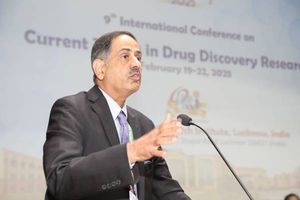Quantum computing, AI to revolutionise drug discovery in India: Ex-ICMR chief
New Delhi, Feb 20, 2025, IANS
 New Delhi, Feb 20 (IANS) Quantum computing and Artificial Intelligence (AI) to revolutionise drug discovery in India, and enable the country to become a global hub for pharmaceutical advancements, said Dr. Balram Bhargava, Former Director General, ICMR. He was speaking at the 9th "International Symposium on Current Trends in Drug Discovery Research” at CSIR-Central Drug Research Institute, Lucknow. “India's strength in drug discovery stems from its rich heritage in chemistry, making it a global hub for pharmaceutical advancements,” said Bhargava, Dean and Senior Consultant, Holy Family Hospital, New Delhi. “The integration of Quantum Computing and Artificial Intelligence (AI) is set to revolutionise drug discovery, accelerating research and reducing costs,” he added. The expert noted that India has consistently demonstrated its ability to produce high-quality, affordable medicines, ensuring healthcare accessibility worldwide. However, challenges such as the availability of Active Pharmaceutical Ingredients (APIs) and the need for new drug discoveries remain key areas of focus. Further, Bhargava called for collaborations to boost India's pharmaceutical success, as seen in the development of vaccines. “Market shaping is equally important, ensuring that innovations reach the masses while maintaining India's leadership in cost-effective healthcare solutions,” he said. The event, aimed to discuss new strategies in synthetic and medicinal chemistry in the country, also witnessed the presence of global experts from the universities of Florida and Minnesota in the US. They spoke on breakthroughs in pain management strategies as well as the need to develop new antimicrobial agents with novel mechanisms. Meanwhile, Dr. Arindam Talukdar from CSIR-Indian Institute of Chemical Biology (IICB), Kolkata, shared his research findings on the stimulation of agonism-antagonism in TLR7 modulators via complex interactions between chemical subunits. The TLR7 is an endosomal TLR protein that helps the body to recognise and respond to viruses and bacteria.
New Delhi, Feb 20 (IANS) Quantum computing and Artificial Intelligence (AI) to revolutionise drug discovery in India, and enable the country to become a global hub for pharmaceutical advancements, said Dr. Balram Bhargava, Former Director General, ICMR. He was speaking at the 9th "International Symposium on Current Trends in Drug Discovery Research” at CSIR-Central Drug Research Institute, Lucknow. “India's strength in drug discovery stems from its rich heritage in chemistry, making it a global hub for pharmaceutical advancements,” said Bhargava, Dean and Senior Consultant, Holy Family Hospital, New Delhi. “The integration of Quantum Computing and Artificial Intelligence (AI) is set to revolutionise drug discovery, accelerating research and reducing costs,” he added. The expert noted that India has consistently demonstrated its ability to produce high-quality, affordable medicines, ensuring healthcare accessibility worldwide. However, challenges such as the availability of Active Pharmaceutical Ingredients (APIs) and the need for new drug discoveries remain key areas of focus. Further, Bhargava called for collaborations to boost India's pharmaceutical success, as seen in the development of vaccines. “Market shaping is equally important, ensuring that innovations reach the masses while maintaining India's leadership in cost-effective healthcare solutions,” he said. The event, aimed to discuss new strategies in synthetic and medicinal chemistry in the country, also witnessed the presence of global experts from the universities of Florida and Minnesota in the US. They spoke on breakthroughs in pain management strategies as well as the need to develop new antimicrobial agents with novel mechanisms. Meanwhile, Dr. Arindam Talukdar from CSIR-Indian Institute of Chemical Biology (IICB), Kolkata, shared his research findings on the stimulation of agonism-antagonism in TLR7 modulators via complex interactions between chemical subunits. The TLR7 is an endosomal TLR protein that helps the body to recognise and respond to viruses and bacteria.